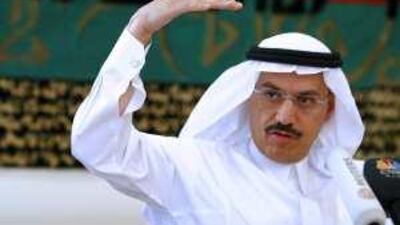Central bank governors from Saudi Arabia, Kuwait, Qatar and Bahrain have started official talks to push forward the GCC monetary union, but have refused to put a deadline on when a single currency would be introduced. During the meeting in Riyadh yesterday, the four Gulf states reiterated their hope that the UAE and Oman would rejoin efforts to form the union.
Discussions began with the election of Muhammed al Jasser, the governor of the Saudi Arabia Monetary Agency (SAMA), as the first chairman of the monetary council, the forerunner of the central bank. Rasheed al Maraj, Bahrain's central bank governor, was voted in as deputy. Both posts are held for a year before re-election. Next on the agenda of the meeting, which concludes today, was the complex task of beginning to set out the technical and legal framework for the union.
John Sfakianakis, the chief economist of Banque Saudi Fransi, said: "Not wanting to commit to a deadline at this stage is a sign they are wanting to achieve credibility by making steadfast progress on the technical aspects first." Unrealistic deadlines set by officials previously for launching a single currency have pushed the timetable for its establishment back from an original target date of this year.
Mr al Jasser said yesterday that the monetary council would not set a deadline for the launch of a common currency. The meeting is the first gathering since the UAE withdrew last May from the plans for the GCC single currency. It followed Oman's exit in 2007. Sultan al Suwaidi, the Governor of the UAE Central Bank, said earlier this month that the country remained committed to the concept of a single currency in the region but ensuring free trade was the priority.
The appointments of Mr al Jasser and Mr al Maraj are seen as an important first step in moving the planned union forward. The election of Mr al Jasser, who runs the biggest economy in the region and is a driving force behind the single-currency proposals, came as little surprise, economists say. Mr al Maraj has overseen the development of Bahrain into an important regional financial centre. Jarmo Kotilaine, the chief economist of NCB Capital, the investment arm of Saudi Arabia's biggest lender by assets, the National Commercial Bank, said: "There is a need to put flesh on the monetary council and create rules about how it will work. This will require time and experience, which is why they've appointed these two experienced men."
Technical committees from the central banks will discuss the most effective exchange rate regime, as well as the powers of the union and monetary policy. A peg to the US dollar is considered the most likely option for the currency initially. All of the council's members except Kuwait peg their currencies to the dollar. Representatives also need to agree on how to harmonise financial sector mechanisms across the states and how to co-ordinate data on economic statistics such as inflation and trade.
Mr Sfakianakis: "It will help to instil greater co-ordination between countries on capital flows between countries and how that needs to be further enhanced as well as how the transfer of goods, services and people between countries will work." It remains uncertain when the preparations will be ready to allow the single currency to become operational. The Kuwaiti foreign minister Sheikh Mohammed Sabah Al Salem Al Sabah said in December the union may take a decade to establish.
However, Rory Fyfe, an economist specialising in Saudi Arabia at the UK's Economist Intelligence Unit, said: "We are quite pessimistic about how soon the monetary union is likely to happen. The states need to be in a position where there's sufficient economic stability." The next meeting of the monetary council is likely to be in three months. * with agencies @Email:tarnold@thenational.ae

